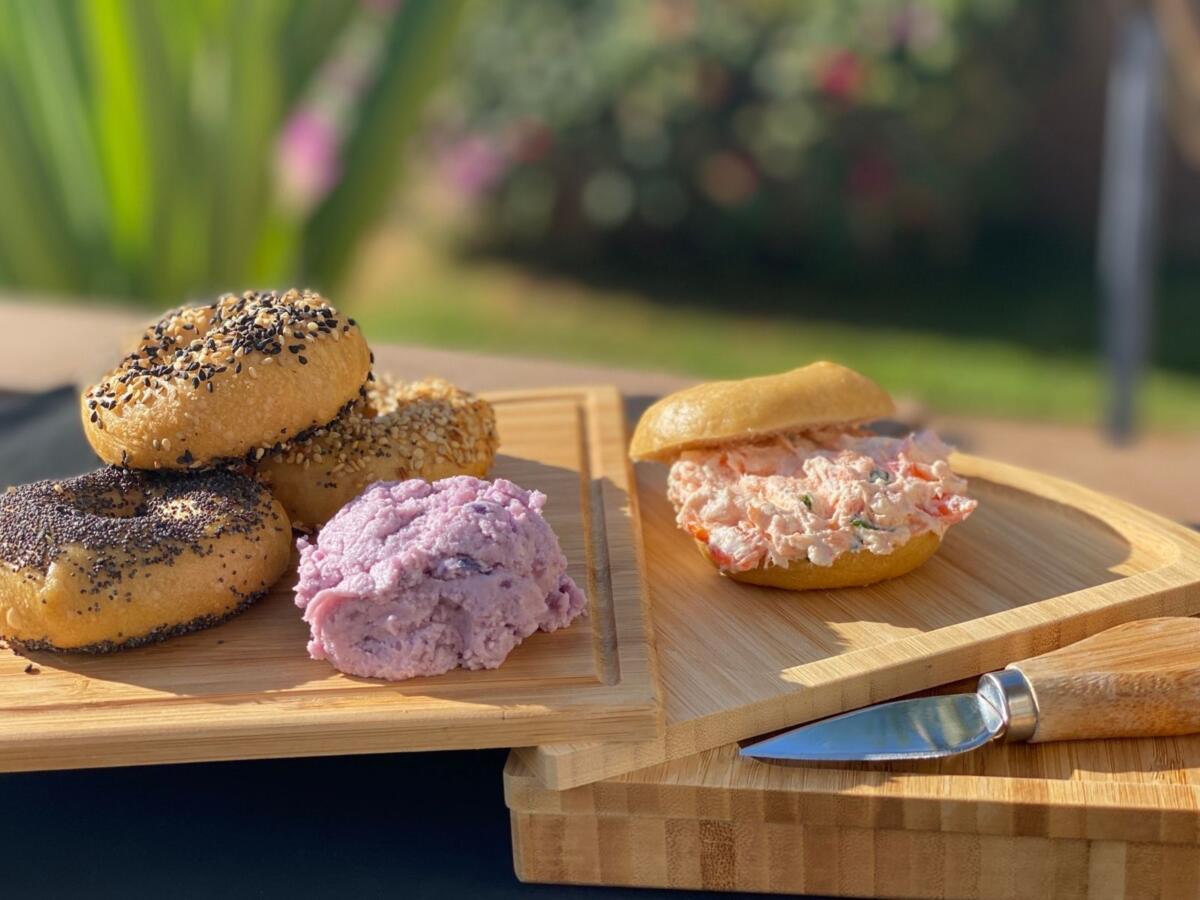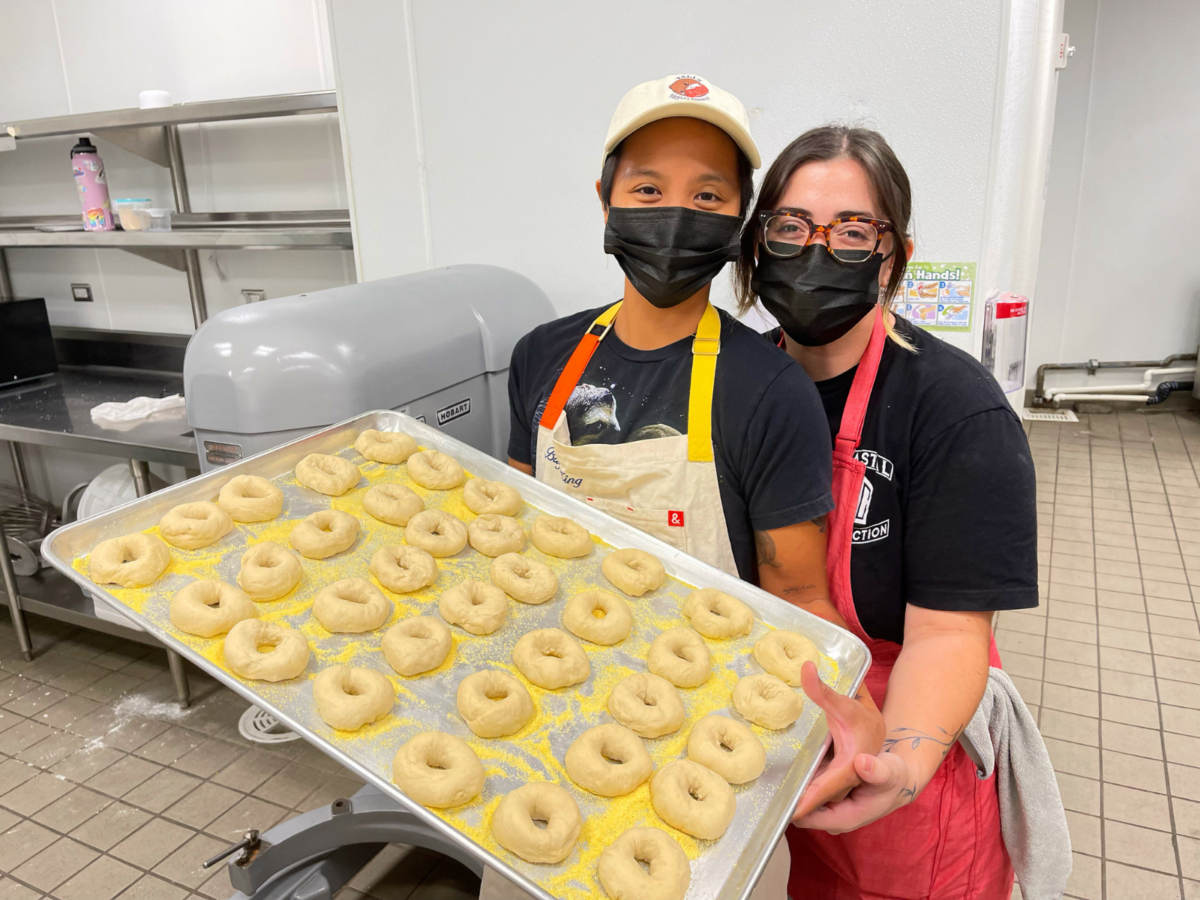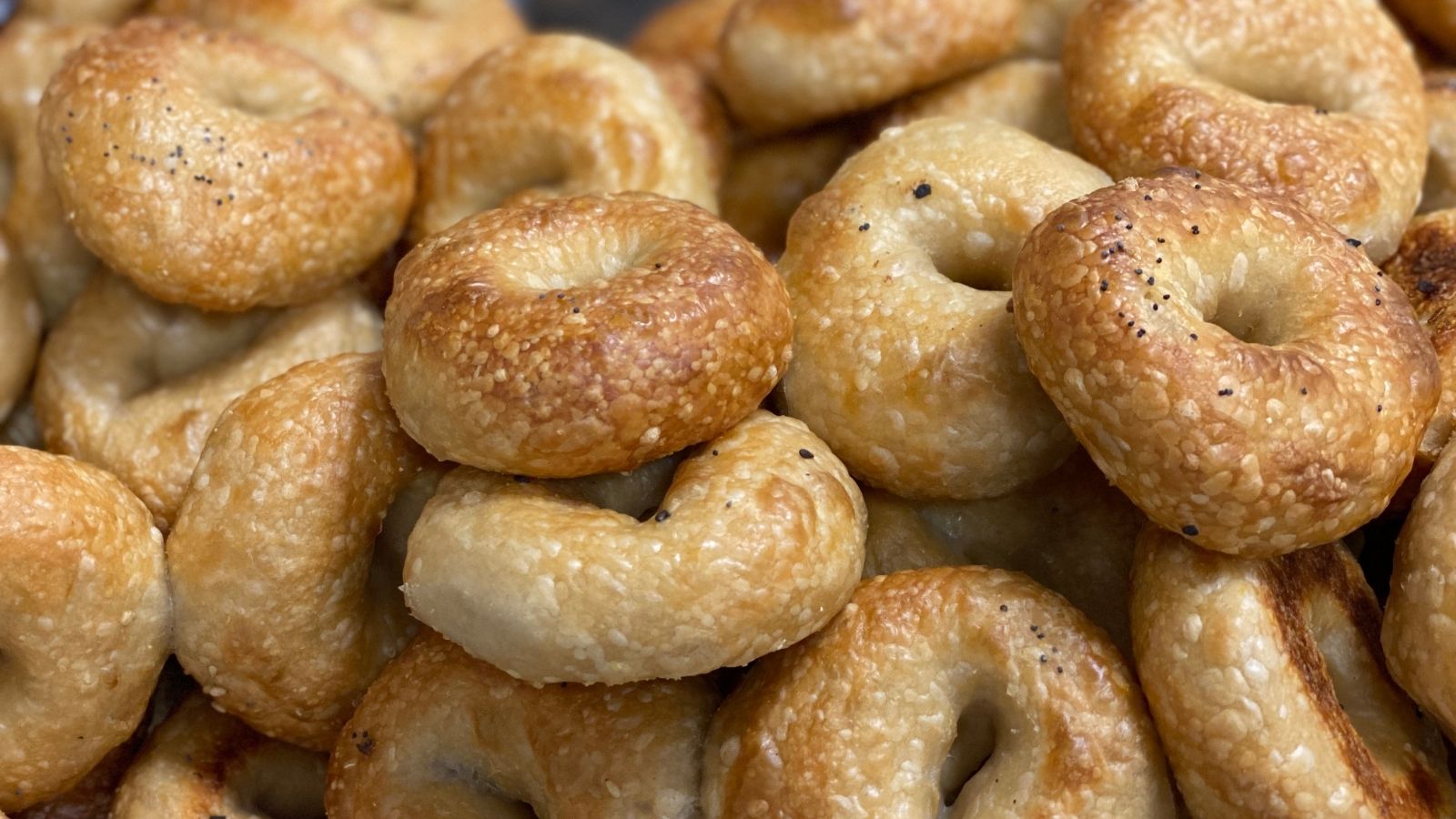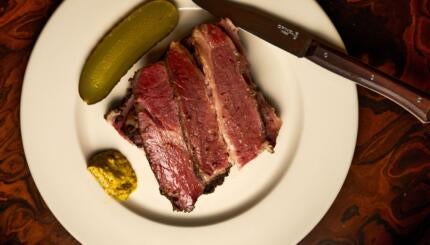If you’re on the hunt for an iconic New York-style bagel — the kind that is crisp on the outside, and tender and pillowy on the inside — Hawaii is probably one of the last places you’d look. The entire Hawaiian archipelago, which is known for its wide variety of cultural cuisines, maxes out around 10,000 Jewish residents. With a community that small, you’d be hard pressed to find an authentic, Jewish-made bagel.
Enter Talia Schwartz and Kelly Bongolan, the couple behind Oahu’s newest and possibly only New York-style pop-up, who are proving that the secret to a good bagel isn’t necessarily the New York tap water.
The venture that would become Tali’s Bagels & Schmear started out simply enough. Talia, who is originally from Long Island but moved to Hawaii for graduate school, and Kelly, who is Filipino but originally from Hawaii, were tired of transporting bagels back to Hawaii every time they visited Talia’s family in New York; a maneuver which was only further necessitated when the main Jewish bakery and deli on the island,This Is It, closed during the pandemic.
“One day we were like,‘Let’s make some bagels! Let’s quit stuffing our suitcases and carry-ons with bagels,'” explained Kelly, who uses they/them/theirs pronouns. Talia added, “We just kind of started testing to see if we could come up with a good bagel. And we did — we hit the sweet spot where I felt the nostalgia.”
The Nosher celebrates the traditions and recipes that have brought Jews together for centuries. Donate today to keep The Nosher's stories and recipes accessible to all.
To reach that taste of nostalgia, the couple developed a fairly traditional bagel-making process; a project that was spear-headed by Kelly, who, for what they lack in professional culinary experience, they make up for in a passion for cooking and baking. Their dough is made from, among other ingredients, combining barley malt syrup with water. Then, the bagels are rolled and boiled, but instead of the typical next step of steaming the bagels, they bake them on cedar wood planks, also known as bagel boards. The entire process is done by hand and results in the four kinds of bagels on their menu: “classic” (also known as plain), poppyseed, black-and-white sesame seed and everything.
Their experimentation began about six and a half months ago. At first, Talia and Kelly opened up a LLC and sold bagels via their Instagram account. But after a while they started applying for stands at farmer’s markets. Now, according to them, their business has really taken off.

“Every market we go to, we’re so afraid that we’re not going to sell anything. I’m always like, ‘Oh, we made too much. Today is going to be the day that nobody comes,’” Talia told me. “But it’s been great. We get a lot of people from the East Coast and from New York who say that this is the best bagel on the island. They’ve told us it’s the closest thing they’ve had to a New York bagel.”
Talia went on,“We always say our goal is to feed the Jews on the island. And then for people who are unfamiliar with the New York bagel-style, we just want to give them something they’re gonna prefer over the other alternatives that they have.”
Another possible key to their success, and one that is certainly less traditional, is the way Talia and Kelly blend local Hawaiian flavors into their schmears.
There are currently nine schmears on the menu, with the most popular being their lomi lox schmear; a schmear that is influenced both by the iconic Jewish lox bagel topping and lomi salmon, a famous local Hawaiian dish. The recipe includes salmon, which they cure and smoke themselves, tomatoes and green and white onions, all blended with their house-made cream cheese.
“I think it really encapsulates the blending of the local and the traditional. And I think, people associate lox with bagels in their minds, so that’s the one they want to try” Talia relayed, with Kelly adding, “And they’re already familiar with lomi salmon.”
Another popular schmear on the menu is their white fish salad. But, instead of cod or haddock, their salad schmear is made from mahi, kajiki or whatever is fresh that week.
“Whitefish salad is a classic Jewish deli food that just isn’t made here. So people who come to our stand and are familiar with Jewish cuisine are always thrilled,” Talia explained, continuing, “And like the lomi lox schmear, we have to cure and smoke the whitefish ourselves; mainly because there aren’t really places here that smoke fish. We’ve had to learn a lot of these things because we wanted to make our menu really authentic.”
The couple’s other Hawaiian-inspired schmears include an ube schmear, cream cheese mixed with chunks of boiled ube, a purple yam that is very popular in Hawaiian and Filipino dishes, along with a haupia schmear. Haupia, also known as Hawaiian coconut pudding, is a traditional Hawaiian dessert made from coconut milk. To make their haupia schmear, Kelly and Talia take leftover coconuts from a coconut milk vendor they share a kitchen space with, scoop out and toast the meat and blend it with their cream cheese.

On the more traditionally Jewish end of the spectrum, Tali’s Bagels and Schmear also serves a vegan everything schmear (everything bagel seasoning mixed with soft tofu), lemon-dill schmear, a tahini egg salad and a “meshugas” schmear: a schmear which combines their cream cheese with habaneros, bell peppers and garlic chives.
Still, even their classic cream cheese schmear has Hawaiian influence, as it is whipped and salted with local Hapa Hawaiian salts.
Kelly and Talia tell me that their goal is to one day have a brick-and-mortar shop. But in a lot of ways, it seems that Tali’s Bagels and Schmear is about a lot more than just the business. For example, Kelly is currently in the process of converting to Judaism.
“I started taking classes like Intro to Judaism last year, and that really connected me with the Jewish community here. And then, when we started this business, I learned even more about Jewish culture. So it’s definitely brought me closer to Judaism,” they said.
Similarly, Talia told me, “In many ways Kelly and cooking have brought me closer to my Jewish identity.”
She added, “[Making bagels] is something that I wouldn’t have done for myself. But I was more than happy to do it with Kelly, who had an interest in Jewish culture from the get-go.”
The business is also a connection to Talia’s personal Jewish history — her maternal grandparents were kosher caterers and her paternal grandfather was a kosher butcher in Jamaica, Queens. “So it does feel like a return to tradition,” Talia said.
As our conversation drew to a close, I asked Kelly and Talia to speak about the importance they find in Jewish fusion food, to which Talia, gently, corrected me.
“I think Jewish fusion is Jewish food entirely. The majority of the Jewish experience is living in the diaspora. And so, many of the foods that we consider Jewish, without the modern fusion component, are little bits and pieces that Jews living all over the world absorbed from the community they were in and gave to the community that they were in.
Talia concluded, “I get very protective over not wanting to assimilate too much, but the way our foods and traditions survive is just by existing in the reality of where they are.”
And, frankly, the reality of Tali’s Bagels & Schmear sounds delicious.



